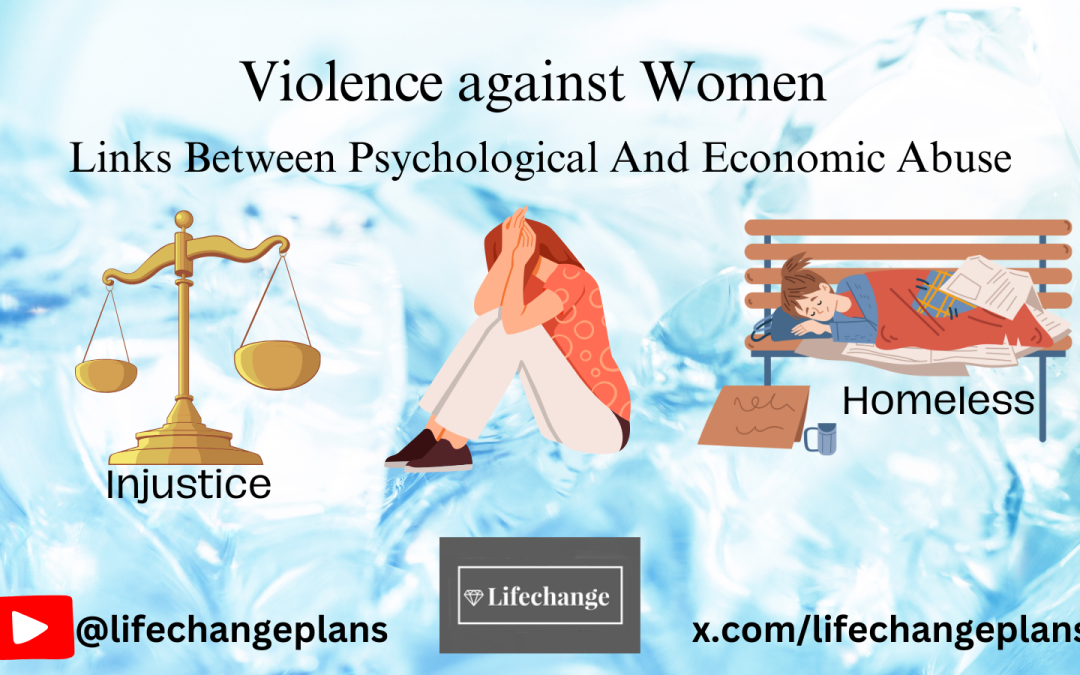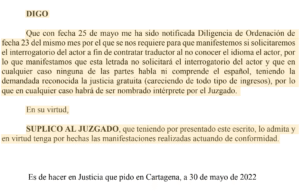Today, I want to highlight my lived experience of psychological and economic Abuse. Against the Evaluation Report of GREVIO, it could be helpful to other women who are campaigning for Justice in other parts of Europe and internationally. The Council of Europe Convention on preventing and combating violence against women and domestic violence (Istanbul Convention) and the Group of Experts on Action against Violence against Women and Domestic Violence, GREVIO.
These situations exist worldwide and are not country-specific.
Here Is My Legal Advice
1. The first legal advice. Stay in the property. Call the Police if threatened. Negotiate. This advice was the same as that of another woman in the Murcia Region who was going through a similar situation with a former partner.
2. The second paid legal advice. File a gender violence complaint. This Spanish solicitor understood English he listened to a recording of a meeting that was meant to be a discussion of the financial settlement. He read a couple of the emails I had received. I also explained other incidents I had experienced while living in Spain, isolated from my family.
I asked if he could write to the other solicitor on my behalf. Enter into legal negotiations.
He repeated his advice to file a gender violence complaint. At this point in October 2020, a former partner had moved on from the amicable, friendly ending and a settlement of €115,000 to “you will leave with nothing” and copied in his solicitor to start Civil legal proceedings to evict me.
That solicitor was not involved in helping me report to the Guardia or representing me in the Women’s Gender Violence Court, although he did provide further advice in March 2021 when I received the court’s judgment. The advice was to appeal as the court had only heard one minor verbal abuse and not a longer case of bad behaviour.
3. A lawyer was publicly appointed for the gender violence court hearing. The case presented to the Court was one of “minor verbal abuse.” The Solicitor did not ask questions or present any further evidence; he turned up just 30 minutes before the Court hearing. I had the help of a court-appointed translator. There were two hearings: October 2020 and January 2021. The judgment was forwarded to me in March 2021 (weeks late, as it was dated January). The Case was Dismissed. The Judge seemed to be saying that I was the cause of the former partner’s anger.
Advice from the free gender violence support services.
4. The advice of the free gender violence support services. I had three free appointments with the legal advisors at the centre after the Gender Violence Court dismissed my complaint.
I was told, “Do not make any further complaints; you will make him angry. Do not move out of the property. Negotiate.” This was in early 2021. I followed the advice. It was 2023 before I understood that “negotiations” and “mediation” in all forms of violence against women are prohibited. It comes under Article 48, paragraph 1, of the Istanbul Convention.
5. Other legal advice I received. Many solicitors in the UK and Spain told me that it was very difficult to prove emotional and psychological abuse. They seemed unwilling to represent me. Or if they did provide a fee proposal, it was clearly costly, with quotes of €3,000 to €5,000. I think they looked at the situation as a “conflict” between two parties instead of the unequal power relation and dominance from a former partner who had even declared “he was in control” while shouting at me in the bedroom of our home in Spain.
Litigation Abuse – Eviction
6. Advice of the free publicly appointed defence in the civil case of “precarious” eviction in 2022. “Go back to the UK, go back to your family”, without first asking if I had family to return to. Completely ignoring my experiences of abuse in the relationship and the unequal power relations between us, the former partner had instructed an expensive lawyer in Barcelona, and I had no form of income. She told me, “He just wants his house back,” and “The judge will order your eviction” This lawyer caused me so much stress and trauma; my stomach was in knots just opening her email communications. I wish I had followed the advice from the court official in Cartenga Instance 3, five days before the eviction hearing, which was that you should sack the lawyer, as she is not helping you. Make an official complaint to the College of Solicitors.
The reason I had gone to the court five days before was to try to present my evidence. The lawyer appointed had not asked for any evidence, meaning that key documents, including the letter of his financial proposal, were missing. My requests to negotiate, the proposal we were meant to discuss, or the handwritten agreement we both signed in July 2021.
When I informed this lawyer of the advice I had been given to sack her, she tried to redeem herself by telling me that I could appeal to the higher court. This was useless, as she told me it would give me more time. The appeal took until mid-2023 to be dismissed. There was no further evidence submitted. Three magistrates look at an appeal. All they had were the ex’s false statements and the lawyer’s appeal statement. She wrote that a genuine offer of 50% of the property’s value had been made. Yet without the evidence being presented. I discovered why the court official had instructed me to sack her. The attorney and solicitor had submitted a letter to the Court a few weeks before. I sought another legal opinion, and the solicitor had instructed me to request all the files. In those files, I discovered the letter which indicated two grounds of “discrimination” under Spanish law. Language and socioeconomic status.
The defence lawyer was not going to interrogate the Plaintiff (the former partner) because we did not speak or understand Spanish. Another lawyer had told me that was not a good enough reason. She also pointed out that because her client had free assistance and lacked any form of income the court would need top appoint a translator. The truth was that the court officer had warned me five days before to find a translator, I asked the court translater who had been with me when I filed the fender violence complaint the same translator who stood next to me in two gender violence court hearings and he attended the eviction hearing pro bono but was surplus to requirements as I was not allowed to speak as the Judge, my legal defence and the opposition defence did not ask any questions. I was denied a voice to speak.
GREVIO
Group of Experts on Action against Violence against Women and Domestic Violence GREVIO – First Evaluation Report, Spain, published 21st November 2024.
The GREVIO report emphasises the prohibition of mandatory alternative dispute resolution processes, such as mediation and conciliation, in cases of violence against women, as outlined in Article 48 of the Istanbul Convention. This prohibition is rooted in the principle that such processes cannot ensure equality between victims and perpetrators due to the inherent power imbalances in cases of violence against women. The state is responsible for providing access to formal court proceedings to avoid re-privatizing violence and to ensure justice for victims. GREVIO acknowledges that mediation is explicitly prohibited in cases of intimate partner violence during criminal investigations or after a criminal judgment. However, it highlights concerns about mediation in family law proceedings, particularly in divorce cases, where women who have not disclosed intimate partner violence may be pressured into mediation without proper screening for abuse. This lack of systematic screening in family law proceedings risks exposing victims to informal agreement processes that are not truly voluntary, potentially amounting to quasi-mandatory mediation. GREVIO stresses that victims of domestic violence cannot engage in mediation on equal terms with their abusers and calls for robust screening for a history of violence and the full, informed consent of victims before mediation is offered in civil law proceedings.
The failings identified include:
- Lack of systematic screening: Family law proceedings often fail to systematically screen for domestic violence, which can lead to victims being pressured into mediation without an examination of the abusive dynamics in the relationship.
- Quasi-mandatory mediation: Practices that encourage amicable settlements or agreements between victims and abusers, with potential negative consequences for victims who refuse, risk creating a de facto mandatory mediation environment.
- Inequality in mediation processes: Victims of domestic violence are not on equal footing with their abusers in mediation, making such processes inherently unfair and potentially harmful.
- Inadequate safeguards: Judges and legal systems may offer mediation in civil law proceedings without ensuring robust screening for violence or obtaining the full and informed consent of victims, undermining their rights and safety.
Mediation and Negotiations
GREVIO calls for stronger safeguards to ensure that mediation is only used in appropriate cases and that victims are protected from coercion or further harm. I know that in the case of the woman I talked to in a similar situation. In a Spanish property in a non-married relationship where she was not on the deeds, was abandoned and had been dependent on his income. There was an agreement between them, and a solicitor was involved. The former partner was no longer in Spain, and at the point of negotiation, where she had a deposit on a property ready to move out, the agreed settlement to complete the purchase was not paid, she lost her deposit on that property. This is “moving the goalposts” on the negotiations, a well-known move of “bad faith actors”. Luckily, her family were able to help, and she was able to instruct a lawyer to open the negotiations and continue to settle a financial arrangement that went through on the payment of a banker’s draft some 18 months later, so negotiations are possible in these situations but only with the cooperation of two lawyers who are both working in the best interests of both parties.
QUOTE From Report on Economic Violence
Globally, economic violence is covered by the Istanbul Convention. Defining violence against women as “a violation of human rights and a form of discrimination against women”, Article 3(a) specifies that it means “all acts of gender-based violence that involve or are likely to involve physical, sexual, psychological or economic harm or suffering to women, including threats of such acts, coercion or arbitrary deprivation of liberty, whether occurring in public or in private life”.
Economic Violence
A research paper from Spain published
Economic control: the abuser exercises this through actions aimed at preventing the victim from accessing or having knowledge of finances and from being able to make financial decisions. Victims of VE report control and limitation of access to financial resources and impediments to accessing basic needs, such as food, clothing and/or medicine. The economic abuser may control the victim’s use of money to prevent access to or hide money earned together, including preventing the victim from having access to a bank account or deceiving them about shared property and assets.
There is a link between economic abuse and psychological abuse. Imagine you are in the sea and struggling to swim ashore. The abuser throws you a lifeline, and you reach out to grab that lifeline, and the abuser snatches it away, and he sits watching you struggle as you grow weaker and weaker while trying to swim ashore to safety. This is how it feels when a survivor is struggling with economic abuse.
A pattern of behaviour
If economic violence is not covered in criminal law, “psychological” violence is, and so is coercion. When I reported to the Guardia in October 2020, I reported emotional and psychological abuse, which was never one incident. It is a pattern of behaviour over many years.
The report also points out that migrant women are twice as vulnerable to EV (Economic Violence) as women born in Spain. Plus, vulnerability factors interfere with access to the labour market and the quality of employment they have. Like other victims of gender violence, economic violence is sometimes not reported due to the survivor’s financial dependence on the abuser. Economic violence is, in itself, a barrier to reporting the aggressor.
It is also recognised that Economic violence that occurs after the breakup of the relationship or that emerges in new types of economic violence makes it difficult for the victim to identify these attacks as gender violence. In turn, it makes reporting them problematic.
This was my experience. When he offered the financial settlement in August 2020, I was looking at properties and trying to work through the grief at the same time. It was only a matter of days before he turned hostile towards me.
Quote – from “What Type Of Man?” By Loren Keeling
Don’t fuck about with me. I’m in control. You do as I say, or I can throw you onto the streets. September the 6th 2020
I consider that to be emotional or psychological abuse. I was being threatened and intimidated. He was shouting in my face I didn’t deserve this type of behaviour from him. He took Civil action in 2021 to remove me from the property; even though, I managed to negotiate when it was “prohibited”. I did not have the same legal representation from the beginning, so there is a disconnect between the advice to file the gender violence complaint, the Women’s court hearings in 2020 and 2021 and the eviction case that was heard in 2022.
The report highlights a phrase.
“And then he would say to me, where are you going to go? If I have the money, I have the power.”
This was similar to how I was spoken to in the meeting that was recorded as we were meant to be having a discussion about the financial proposal he had written.
When he said, “Your future security depends on having me on your side, so don’t alienate me, and I’ve told you already, you can’t negotiate a gift. So – I’m telling you how it’s going to be, and you have various options open to you. Help me sell this place, or buy it yourself, or just sit here until the 15th of January and fuck off.”
Hidden forms of abuse, like psychological abuse and financial abuse, can happen to women across all socioeconomic groups. There are certain factors that come together to worsen the situation. Lack of support networks, the complex institutional barriers or deficiencies in the detection of the abuse, and the indirect actions of companies (such as banking, finance or mortgage brokers) continue to disadvantage women in rebuilding their financial security
Surviving Economic Abuse
In the UK the organisation “Surviving Economic Abuse” SEA has campaigned to have economic and financial abuse recognised as domestic abuse. They have also spoken to survivors to obtain lived experience and they work with financial institutions to inform them of the impact of economic and financial abuse. Many UK banks and HMRC have specialist advisors for those who are vulnerable in a situation of financial abuse.
For more details, visit the SEA website.
Quote – LawSociety Financial Abuse
Financial abuse is a form of domestic abuse under the Domestic Abuse Act 2021 (DAA 2021). It is referred to as ‘economic abuse’ and is defined in section 1(4) as ‘any behaviour that has a substantial adverse effect on B’s ability to: (a) acquire, use or maintain money or other property, or. (b) obtain goods or services
Threatened With Homelessness
Here is another quote from a victim-survivor of economic abuse.
“When your home is threatened you are threatened and it’s really scary.”
I can relate. There are women who are in long-term, non-married, cohabiting relationships that are treated like second-class citizens when their relationships end. It is not just a “conflict over property” normal adult people can sit down and discuss things and come to an amicable solution. I know as I have been through a divorce with no anger or legal conflict, just a separation and then a legal divorce. No panic, no grief, no fear or uncertainty. However, in situations of unequal power relations and dominance from a former partner, things can be very different. My journey, for example, and that of a friend who went through a similar experience and came out of it with a settlement and a smaller property owned outright. Another friend had to leave the shared property after her partner turned hostile while he was cheating on her. She escaped a coercive relationship and was left with no financial security or settlement after years in a relationship.
Conclusion
The laws on Gender Violence in Spain cover all forms of violence against women.
Organic Law 1/2004 on Gender-based Violence covers violence exercised against women by their present or former spouses or by men with whom they maintain or have maintained analogous affective relations, with or without cohabitation, as an expression of discrimination, the situation of inequality and the power relations.
The law covers married and non-married relationships with or without cohabitation.
However, regional laws on gender equality and violence against women mean that there are disparities between communities. And trying to obtain justice as a female foreigner in Spain has been a journey I would rather not have experienced, but here I am.
There needs to be continuity in legal representation. There should be a step-by-step process that legal professionals, police, and social workers can follow to ensure that women are not discarded and left in vulnerable emotional and financial situations by men who lack morals and empathy, can manipulate and misrepresent the facts and do not take responsibility for their own decisions.
Research Documents
“Spain – Istanbul Convention Action against violence against women and domestic violence”
https://www.coe.int/en/web/istanbul-convention/spain
STUDY OF ECONOMIC VIOLENCE AGAINST WOMEN IN THEIR RELATIONSHIPS WITH PARTNERS OR EX-PARTNERS
https://violenciagenero.igualdad.gob.es/wp-content/uploads/RE_Violencia_economica.pdf
No 1 in Self-Help For Abuse. October 2024
Post Separation Abuse. Betrayal and Abandonment. What Type Of Man?

Available on Amazon UK: What Type Of Man?
Or Amazon US: What Type Of Man?
If you are experiencing post-separation abuse or economic abuse in a relationship, I have made a collection of helpful recommended readings, which is available on my SHOP page here.
Titles such as “Should I stay or Should I go by Dr Ramani.
A Practical Guide to Coercive Control for Legal Practitioners. By Rachel Horman.
How to Identify and Heal from Narcissistic People. From Dr Ramani.
Check out all the titles.
#CommissionsEarned” “As an Amazon Associate, I earn from qualifying purchases.”






